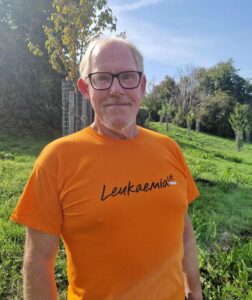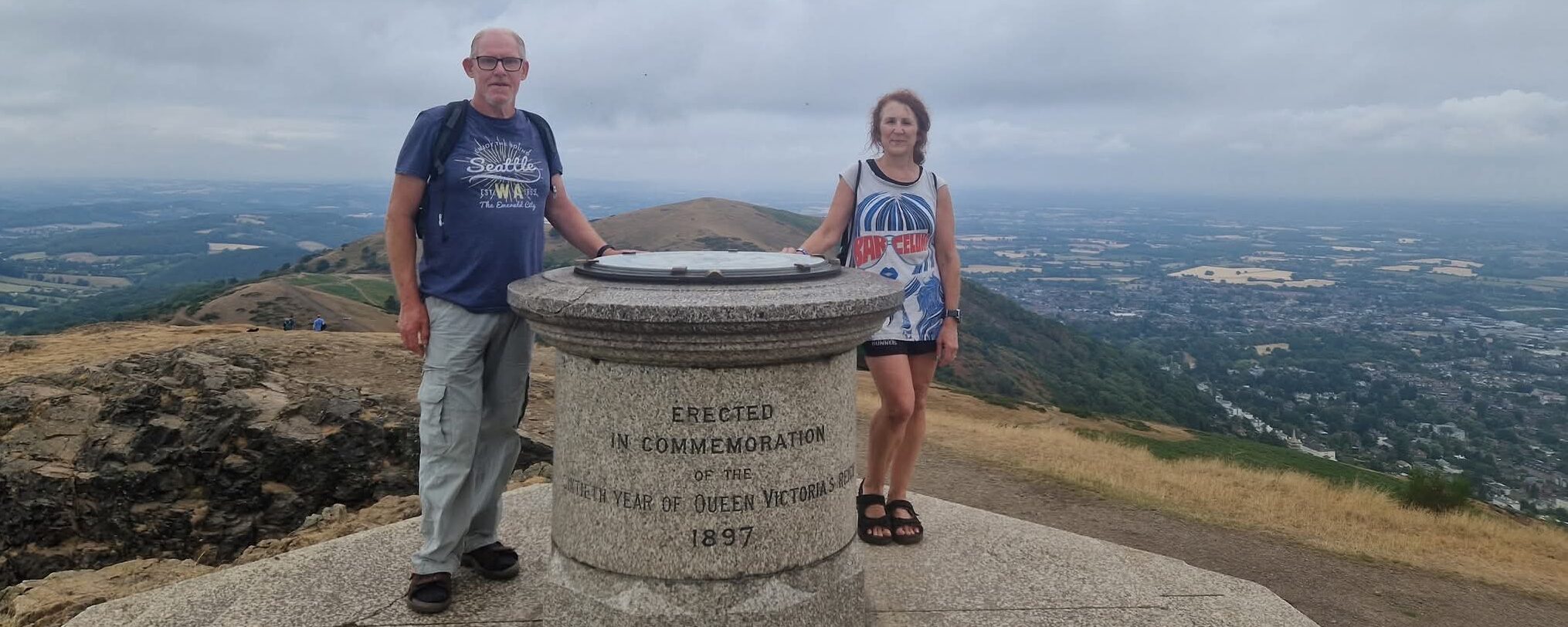
24 Sep 2025
Leukaemia diagnosis and treatment changes people forever.
“But there’s no doubt it has had a major physical, psychological and emotional impact on me. I no longer take anything for granted. In some ways I am more risk averse, and I worry and fret more about little things. However, it has also clarified my path for the future, leading me to constantly focus on living the best life I can.”
Gerard Watson
Leukaemia diagnosis and treatment changes people forever. Not just the gruelling medical treatment and physical journey, but the mental adjustment to ‘life after leukaemia’. Gerard Watson, like many, was determined to get back to ‘normal’, including his favourite pastime of Park Runs. He found that Leukaemia UK’s 60km fundraising walk in June 2025 played an enjoyable part in this. And alongside physical activity he also discovered an important new mental approach to life.
“It was around July 2023 that I first noticed my energy was lower,” said Gerard, 63, from Kingswood, South Gloucestershire. “By Christmas it had got so bad that I had to lie down on my bed in the afternoons and couldn’t climb stairs without feeling breathless. In January 2024 I started to get stomach upsets, night sweats, unintended weight loss and loss of appetite.”
He visited his GP in November. A blood test showed his white blood cells were a little high but within normal limits.
“Then I got some quite spectacular bruising on my arms. One side looked like I was wearing a black sleeve. I’d had a fall a few weeks before and thought it was from that. But then bruises appeared on my legs, and I had a huge lump on my calf after brushing against a car door. That’s what got me to the doctor for the final time. I saw a locum GP who didn’t like the look of it and sent me into Bristol’s Southmead Hospital that afternoon. I am so grateful to that locum GP!”
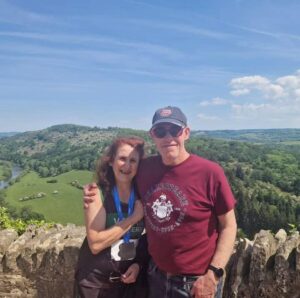
Gerard during recovery.
On 19th February 2024, after more tests, Gerard was diagnosed with acute myeloid leukaemia (AML).
“I remember the doctor drawing the screens before telling me and my wife I had advanced and aggressive blood cancer. We both broke down. They did a bone marrow biopsy which confirmed AML with FLT3 & NPM1 mutations. I was told if I didn’t start treatment immediately I would be dead in two weeks. I was devastated. From the little I knew, I thought leukaemia was a death sentence. I couldn’t process the news, and I dreaded the future.”
Southmead contacted the Bristol Royal Infirmary (BRI) but couldn’t find a bed that night, so Gerard began chemotherapy pills immediately.
“The BRI consultant said they had never seen such a high white blood cell reading. I was transferred the next day and began endless blood transfusions, chemotherapy, other medication, tests and scans, and had a PICC line fitted. At first I felt OK but pretty rapidly I became very unwell.”
He stayed in hospital for seven and a half weeks through his first stage of chemotherapy.
“My wife Karen came in every single day, often working in my room. But for much of the time I was asleep and barely able to whisper, I was that weak. I had neutropenic sepsis, C. Diff, pneumonia and blood clots. I ran a fever every day for 40 days straight, sometimes above 40 degrees. I learned the true value of paracetamol.
“I was a regular runner but my muscles atrophied so quickly I could hardly get out of bed. My hair fell out. Food nauseated me and I dreaded the dinner bell. One night I had a fountain-like nosebleed that took an hour to stop. I also had major visual disturbances – it later transpired I’d suffered a minor stroke due to the leukaemia and treatment, which knocked out a quarter of my vision.
“I really did reach a point of being very low and feeling like it was the end. At one stage I was assessed by the ICU outreach team to see if they needed to transfer me. They appeared round my bed dressed in white gowns watching me in silence in the early hours while I was delirious – I came round and saw them and thought the worst had happened! But thankfully not. I was allowed home briefly in April but only after my fever had finally gone for three days. I was very weak and lay downstairs on the couch most of the time. I went back in mid-April and tolerated the next stage of chemotherapy much better apart from some mucositis and rashes.”
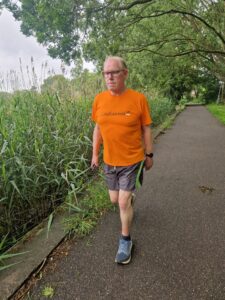
Gerard on the 60km walking challenge
Gerard returned home in May. Feeling fitter, he even managed to return to his beloved Park Runs, completing the 5km in 1 hour 17 minutes, which he calls a PW – personal worst! His consultant explained that to avoid relapse he would need a stem cell transplant.
“I had my transplant on 6th June 2024 – my personal ‘D-Day’. My cells came from an amazing, selfless person in Denmark. I had received the legendary ‘very scary talk’ from my consultant on survival chances (60/40). I signed the papers anyway, as the alternatives were worse. I also had several teeth extracted beforehand to reduce infection risk. One large molar was very deep-rooted and needed a massive pair of pliers and a powerfully-built dental surgeon to remove it – I was not very happy by that stage, but it was vital to my successful treatment.”
He came home just 13 days after transplant, still weak.
“I had lost three stone in weight, had no appetite, no hair, and was very tired. But my bloods came back quite well, indicating good engraftment, and I was weaned off immuno-suppressants quickly. Gradually, I began to recover.
“I am now back at work part-time, my hair has grown back, I have put the lost weight back on, and I have had no Graft vs Host Disease or virus reactivation. But I still get overwhelmingly tired at odd times and wearing shorts this summer led to colourful rashes on my legs. I will have to take a fistful of meds twice daily for the rest of my life. My lost vision will probably not come back. But my donor chimerism has generally been about 100%. I remain in remission but every bone marrow biopsy is of course an anxious time.
“It became very clear to me that life is to be enjoyed while we can, so I took a pension from my previous civil service job earlier this year, and my wife and I have travelled to Germany and The Netherlands, along with weekend breaks in the UK. I recently hiked the highest peak in the Malvern Hills, not bad going when a year ago I could barely walk 1km!
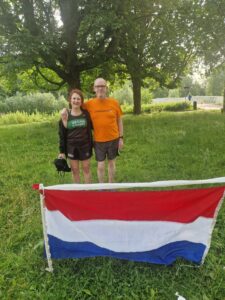
Gerard taking on the 60km walk for Leukaemia UK in the Netherlands.
“I generally walk between 40-50km a week, and I absolutely loved taking part in the Leukaemia UK 60km walk across June 2025. I saw it on Facebook and joined the group and found the other people taking part and posting about it absolutely inspirational. I loved seeing all their photos, sending messages and cheering people on, and I even made a couple of friends who I am still in touch with. I was amazed to raise £745. It was great to be part of something bigger than yourself and made me appreciate how lucky I was as I know what a challenge it was for some people who took part.”
Gerard has been doing Park Runs since April 2012, when he gave up smoking and drinking.
“The doctors said my level of fitness probably helped me with my recovery. I can run about 3km continuously now, but not a full 5km yet without walking. On Saturday 30th August I completed my 500th Park Run with a time of 39 minutes 59 seconds.”
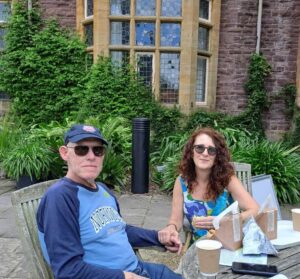
Gerard after treatment.
He has also taken up painting and returned to singing in a choir.
“I feel so incredibly fortunate to still be here, eternally grateful to my donor for my second chance at life, and to the NHS for the care and treatment I received. None of this comes cheap, but to get me to this stage has taken not just money, but also love, care, patience, compassion, dedication and expertise. I therefore owe it to so many people to appreciate all this, to fight, and to stay well.
“But there’s no doubt it has had a major physical, psychological and emotional impact on me. I no longer take anything for granted. In some ways I am more risk averse, and I worry and fret more about little things. However, it has also clarified my path for the future, leading me to constantly focus on living the best life I can.”
Share your story
We want to help people tell and share the leukaemia stories that matter – stories like Gerard’s and stories like yours.
Related posts
12 October 2022
“Who’s Cooking Dinner?” makes a spectacular return to The Dorchester
On 10th October 2022, Leukaemia UK’s flagship fundraising event, “Who’s Cooking Dinner?”, returned to The Dorchester Hotel. Above: Fiona Hazell, Leukaemia UK Chief Executive, Iona Beastall and Dr Kostas Tzelepis….
1 August 2022
A research breakthrough targets cancer over healthy tissue, bringing possibility of a new treatment option for most deadly type of leukaemia
A new scientific paper published on 22nd June in Science Translational Medicine, announced a breakthrough by Leukaemia UK-funded scientist Dr William Grey that could lead to a vital new treatment option for…
31 October 2022
Leukaemia UK appoints new Director of Communications job share from Shelter to lead their ambitious strategy
Blood cancer research charity, Leukaemia UK, has hired Anna Wilson and Lizzie Afonso from housing and homelessness charity, Shelter, to job-share its new Communications Director role. This is the first…
25 August 2022
Leukaemia Care and Leukaemia UK join forces with funky feathered friend to make disease symptoms more memorable
The two leading UK leukaemia charities have launched a collaboration today with a difference. They’ve joined forces with a blue and gold Macaw parrot called Henry to create an original…
